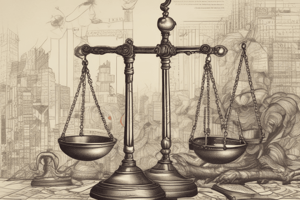Podcast
Questions and Answers
What is the term used to describe the physical acts and circumstances that must be proven to establish criminal liability?
What is the term used to describe the physical acts and circumstances that must be proven to establish criminal liability?
- Actus Reus (correct)
- Causation
- Omissions
- Mens Rea
Which of the following best describes 'Mens Rea'?
Which of the following best describes 'Mens Rea'?
- The legal consequence of a crime
- The moral blameworthiness of the accused
- The physical act of committing a crime
- The guilty mind or intention behind a crime (correct)
What does the concept of 'Causation' refer to in criminal law?
What does the concept of 'Causation' refer to in criminal law?
- The circumstances surrounding an act
- The link between the accused's actions and the resulting harm (correct)
- The legal framework for defense
- The motivation behind a crime
Which of the following scenarios exemplifies 'Omissions' in criminal law?
Which of the following scenarios exemplifies 'Omissions' in criminal law?
In the context of common law, what does moral blameworthiness determine?
In the context of common law, what does moral blameworthiness determine?
What does the phrase 'Trial by ordeals' refer to?
What does the phrase 'Trial by ordeals' refer to?
Which of the following is NOT a primary source of criminal law?
Which of the following is NOT a primary source of criminal law?
Under the Criminal Code, how can someone be considered party to an offence?
Under the Criminal Code, how can someone be considered party to an offence?
Flashcards are hidden until you start studying
Study Notes
Historical Origins
- Crime was once a conflict between individuals.
- Now, crime is a public offense against the state.
- Trial by ordeal was once used to determine guilt or innocence.
Primary Sources of Law
- Criminal Code of Canada was established in 1892.
- Regulatory Offences include activities that are legal unless otherwise specified.
- Common Law is based on previous judicial decisions and precedents.
- Common Law helps maintain justice and moral blameworthiness.
Actus Reus
- Latin for "Guilty Act."
- Requires proof of three components: Voluntary conduct, actual conduct, and consequences.
- All three elements must be proven beyond a reasonable doubt to establish actus reus.
Causation and Intervening Acts
- Causation: Legal link between the accused's conduct and the consequences.
- Intervening Act: Event or action between the act and injury that breaks the causal link.
Omissions
- The failure to act when obligated by law.
- Quebec has a "Good Samaritan" law.
- Omissions can be difficult when drug or alcohol use is involved.
Mens Rea
- Latin for "Guilty Mind."
- Focuses on the accused's mental state during the crime.
- Includes subjective and objective elements.
Subjective Mens Rea
- Intention: Acting with the goal to cause a specific result.
- Knowledge: Knowing that an action will cause a specific consequence.
- Recklessness: Being aware of a risk but proceeding anyway.
- Willful Blindness: Deliberately ignoring a potential risk.
Objective Mens Rea
- What a reasonable person would have known and done.
Murder
- Crown must prove that the accused intended to cause the victim's death.
- There are degrees of murder.
- Self-defense requires three elements to be established.
Modes of Participation
- Party to an Offence - Section 21(1) of the Criminal Code:
- Principal: Commits the act.
- Aider: Assists the principal.
- Abettor: Encourages the principal.
Studying That Suits You
Use AI to generate personalized quizzes and flashcards to suit your learning preferences.




